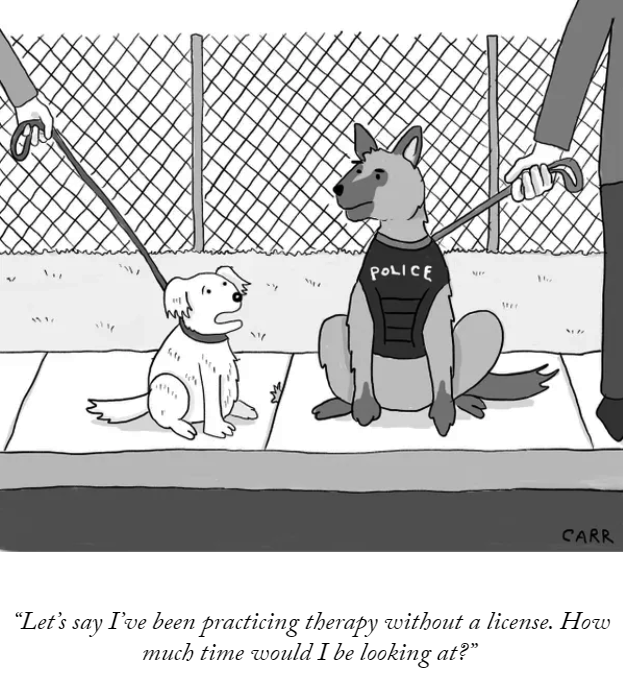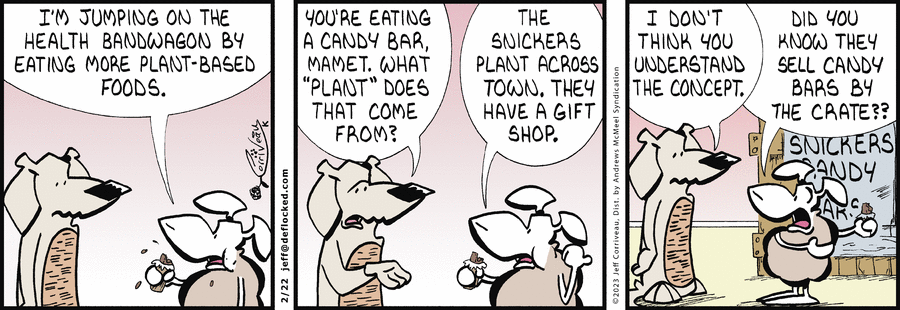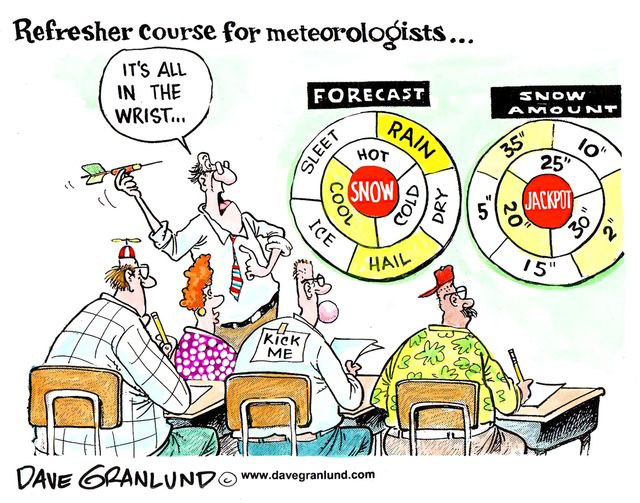CSotD: Weekend Update
Skip to commentsFirst, a bit of serendipitous timing, as Pros And Cons (KFS) manages to unintentionally comment on the decision by New Mexico authorities to drop the firearm enhancement charge in the case in which Alec Baldwin faces an involuntary manslaughter accusation for the accidental, fatal shooting on the set of a movie.
Turns out that, as in the Pros & Cons strip, the law had changed after the incident, and, while they might have pursued a similar charge under the old law, the new law made it more difficult.
The DA’s representative said “The prosecution’s priority is securing justice, not securing billable hours for big-city attorneys.”
Y’know: The kind who know what the Constitution says about ex post facto laws not because they went to some fancy-pants Ivy League law school but because they learned about it the way the rest of us, in eighth grade social studies.
I’m generally supportive of small town folks, but this is starting to look like “My Cousin Vinny.”
On to lesser things.
Still on the topic of the law, Chelsea Carr opens a subject that might get me in trouble with some of my dog’s human friends.
I’m all in favor of for-real-genuine therapy dogs for people who for-real-genuinely need them, and service dogs in general are legally the equivalent of wheelchairs or crutches, necessary appliances that cannot be barred from public places.
However, you can’t just put on a pair of sunglasses and pretend to have a Seeing Eye Dog, and you shouldn’t be able to buy a phony service dog harness on-line and pretend to have a therapy dog. Or turtle. Or peacock.
But you can, if that’s the sort of person you are.
Are we too restrictive in the places we let people bring their dogs? I think so.
Is that an excuse for undermining the credibility of for-real-genuine therapy dogs? I think not.
Deflocked (AMS) scores a rare miss, in that, AFAIK, candy bars are, barring some milk-fat, essentially plant-based. It’s at least arguable.
The gag would have worked better if he’d patronized a jerky plant or a Slim Jim plant instead of a Snickers plant.
This strip is usually on top of things, but syndicates do have editors. Where’s Mona Lisa Vito when we need her?
Juxtaposition of the Day
The idea that meteorologists are just guessing is a comics page standard, and maybe it goes back to the Dark Ages before computers.
My stint in TV was back in those dark ages, the mid-70s, and our “weatherman” was our national salesman, a kindly old duffer who spent most of the day scheduling Crest toothpaste commercials.
But at five o’clock, he’d put on his jacket, straighten his tie, rip the NWS forecast off the Teletype machine and then stick some suns and raindrops and bed springs up on a felt board map and read the forecast into the camera.
However, my experience in the years since is that the local TV meteorologist can be more hip to what’s going on than the anchors.
Maybe I’ve just been lucky, but the weather folks I’ve watched in the past quarter century or so have been very precise in laying out the probabilities and explaining what might change them. Most are at least double-checking the NWS data, if not making their own predictions.
We were under a winter storm warning for Wednesday into Thursday, and the precise hour differed from one station to another, but the snow came in overnight as predicted. Our town was in a very narrow 2-4″ band while everyone around us got 8-12″ and that’s how it happened.
I’m not doubting that there may still be some rip-and-read felt board jockeys around, but the ones I remember have long-since disappeared.
The author has died, the controversy lives on
I wish I’d held off on the Roald Dahl matter, because more cartoons are coming in and Cathy Wilcox had a particularly sharp response, with the father dutifully reading the new, improved, inoffensive version of the book while the kid falls asleep, as well she might.
I’ve also since learned that Dahl’s books will not be bowdlerized in their American versions, nor will the French and Dutch translations be altered.
It appears to be strictly a UK phenomenon, which leaves open the question of where booksellers in Wilcox’s native Australia get their copies, though they have finally dropped the monarch from their banknotes. Baby steps.
I did, however, find an Australian story in which some kid lit authors say they change things in their already-published work with some frequency, the factor there being that they’re alive to agree to it, and that they seem pretty frank in viewing their work as a product and not high art.
When I was directing young reviewers, we quit listing a particular author’s work for them to choose because not only was every one of his kids’ books the same, but the pace at which he extruded them led to rumors that he was not perhaps the actual writer.
But, hey, Subway has recently made major changes in their sandwiches, and they had every legal right to do so!
Sturgeon’s Law applies: Ninety percent of everything is crap. That’s how it has always been, and time has generally done a good job of sorting things out. Some authors aim for that 10 percent, some land there by happenstance, some are simply performing a job.
For instance, nobody reads Edward Bulwer-Lytton anymore, but he was a best-selling author in his time. Today, he’s only known for having written “It was a dark and stormy night,” and for having persuaded Dickens to rewrite the poignant ending of “Great Expectations,” which today is usually published with its better, original ending as an addendum.
What seems different today is that commercially popular things spout endless sequels and prequels and spin offs, and the ones that disappear keep getting resurrected. There’s a new Barney coming, and while it’s hard to imagine it not being an improvement over old Barney, the appeal of old Barney was nostalgia, not quality.
There’s also a re-boot of Fawlty Towers coming, and that was a matter of quality that not only seems hard to recreate, but has repeatedly proven so.









Comments 13
Comments are closed.